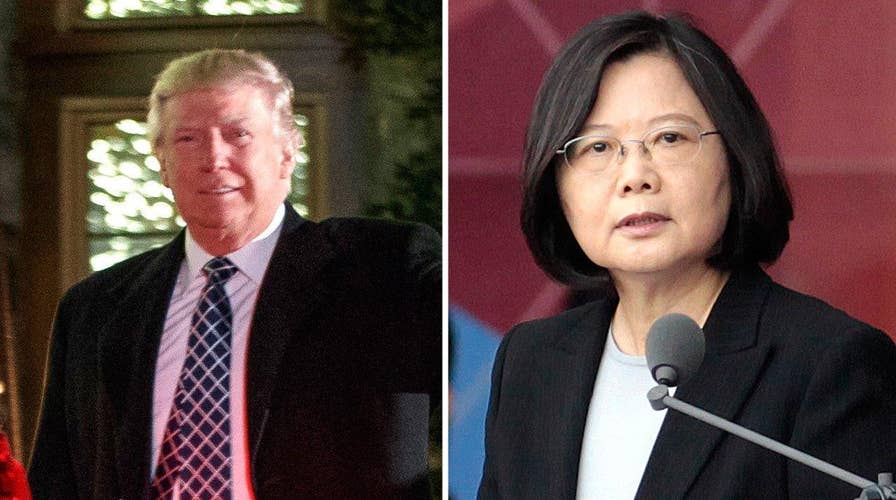Trump's call with the president of Taiwan sparks outrage
Jennifer Griffin has the details for 'Special Report'
President Obama’s former national security adviser said Monday that President-elect Donald Trump’s phone call with the president of Taiwan should not be seen as a big deal.
Offering his perspective in an interview with Fox News, retired Marine Corps General Jim Jones said, “That didn't bother me, I think the purists are flapping their wings and saying all kinds of things. Why they can't have a five minute conversation or whatever it was to say congratulations doesn't make a lot of sense to me.”
“I think the Trump administration will have to find whatever the right course is, and the right things during their administration, but I wouldn't prejudge what that would be right now,” Jones said. “He's not the president of the United States right now, he's the president- elect. He's talking to a lot of people around the world and that's not necessarily a bad thing.”
Trump is the first president or president-elect to speak with a Taiwanese leader since the United States broke-off relations with Taiwan in 1979 under President Jimmy Carter, when his administration established formal relations with Beijing, marking the start of the one-China policy.”
“I think the policy is fine,” Jones said. “I think we should lighten up a little bit about the importance of phone calls and signals that may or may not have been sent. I think policy is pretty stable and the Chinese relationship is very important.”
For the first time, China sent a pair of bombers capable of launching nuclear weapons to circle Taiwan, two US officials tell Fox News. The incident occurred November 26, less than a week before Trump's controversial call Friday with the president of Taiwan, Tsai Ing-wen, angering Chinese leaders who lodged a diplomatic protest the next day.
Japan scrambled eight F-15 fighter jets to intercept the two Chinese H-6K bombers and their two escort planes at one point northeast of Taiwan, according to officials.
Trump's response to critics of his phone call came in a tweet Friday.
"Interesting how the U.S. sells Taiwan billions of dollars of military equipment but I should not accept a congratulatory call."
U.S. arms sales to Taiwan have totaled more than $46 billion since 1990. In December 2015, the United States, under President Obama, announced a $1.83 billion arms sales agreement with Taiwan, the first arms sale in four years.
Critics were outraged that Trump had broken decades-long policy by speaking with Taiwan’s president. When asked on CBS’s “Face the Nation” Sunday if he thought Trump was speaking to the leader of a sovereign nation, Trump’s future chief of staff, Reince Priebus, said, “He knew exactly what was happening. But look, we have a lot of problems to solve in this country, and we’re not going to solve them by just making believe that people don’t exist. This is not a massive deviation of our policy.”
Since the Chinese civil war in the 1940s, China and Taiwan have been ruled separately. China claims sovereignty over the island.
The White House was on the defensive Monday. White House Press Secretary Josh Earnest said officials had already made at least two calls to the Chinese.
“I can confirm that U.S. officials, including senior officials on the national security council, been in touch with their Chinese counterparts to reiterate our country’s continued commitment to one-China policy,” he said.
Trade tariffs are another point of friction. China imposes a 25 percent tariff on imported cars, for instance, while the United States has either eliminated tariffs or charges two and a half percent or less for overseas products - a huge advantage for China.
The flight around Taiwan consisted of two Chinese Xian H-6K bombers, along with two escort planes, a Tupolev Tu-154 and Shaanxi Y-8, flying around the island of Taiwan from mainland China, taking off and landing from two separate Chinese military bases.
The escort jets were used to collect radar information and conduct other surveillance on American allies such as Japan, Fox News was told. The Chinese bombers stayed in international airspace, according to officials.
At different points of the flight, Chinese J-10 and Su-30 fighter jets performed escort duties for the Chinese strategic bombers.
"China has steadily built up a massive military capability in the area around Taiwan. This isn't simply a matter of flying bombers. Understand that technically, we can't object to flying bombers near Taiwan if we are flying combat aircraft and reconnaissance aircraft near China. This is simply legal under international law," said Anthony H. Cordesman, the Arleigh A. Burke Chair in Strategy at the Center for Strategic and International Studies.
"Taiwan faces a much more serious Chinese challenge than it has ever faced before."





